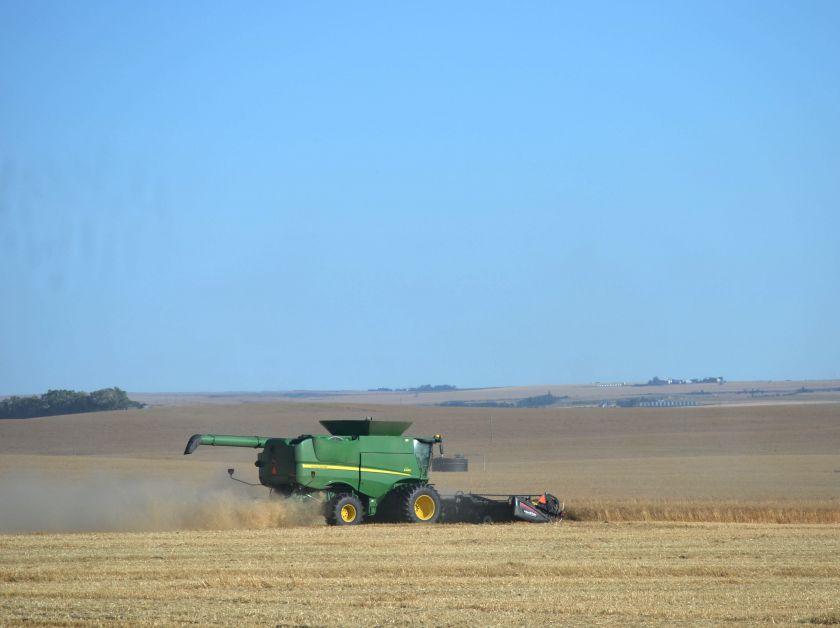
Farming is often a multi-generational family endeavour, and farm wives play an integral role in the smooth operation of farm life - from raising children, tending animals, making sure the family is fed, and helping out in the fields alongside their husbands.
The MacDermid family are no exception. The family farm north of Drumheller in Starland County is currently being operated by the fourth generation of MacDermid farmers while the fifth generation is growing up and learning the ways of farm life.
Muriel MacDermid, the family matriarch, told the Mail, “We started farming in 1954 on a half section of land.”
When she and her husband Dan first moved onto the land, the original homestead, which is a few kilometres north of their present home, had no electricity, no storm windows, and no insulation. Instead, they used gas lamps for light, coal to heat their home, and a coal oil fridge and stove.
Operations on the farm started small at first.
Through the 1950s and 1960s they raised chickens and pigs. Muriel recounted how Dan took orders from restaurants and shops in Drumheller.
“Every Friday was chicken day,” Muriel recounted fondly.
Muriel would boil water on the coal oil stove to pluck the chickens; while the water boiled Dan would get the chickens ready. Then they would pile into the car and make their deliveries.
Once deliveries were done and they had cleaned up, they would treat themselves by going out for waffles, Muriel recalled fondly.
Muriel grew up in the Livingston district, between Verdant Valley and Drumheller, and was familiar with farming operations. She was a member of the Munson branch of the Alberta Women’s Institute for Home and Country, which ran from 1912 until 1999, and helped provide local women obtain skills in management and leadership and provided a community and social networking.
Though Muriel says she did not work in the fields, she helped keep the farm running in other ways, keeping a garden and sewing clothes for the family.
Muriel remembers many trips to the field to make sure Dan and other hired workers were kept fed during harvest and seeding. At one time they bought a camper which Muriel then used to bring meals to the field.
“I really enjoyed taking meals out in the camper, it was much more sophisticated,” she reminisced. She said the camper allowed workers to wash up before eating, and Muriel recalls how Dan would sometimes “stretch out” before returning to work.
Both Dan and Muriel are retired from the farming side of things, but Muriel likes to keep active around their homestead. She mows the grass around the property and raises a garden as she did in the 1950s. “No animals, though,” she chuckled.
Dan and Muriel moved out of their original homestead in 1981, and their son Brian and his wife Kathy took it over at that point.
Kathy MacDermid grew up on a cattle and grain farm in the Rumsey area and was involved with the Rumsey-Rowley 4-H beef and sewing clubs.
Being part of the clubs helped Kathy learn a number of important skills, from operating heavy equipment such as tractors and combines, to working the land with cultivators and seeders. Although she says the equipment and practices of farming have changed over the years, one thing has remained the same.
“Whether you farm 160 acres or 10,000 acres, the most important component of the family farm is the people,” Kathy told the Mail. “Everyone has many roles that are integral to the success of the farm, from field work to bringing meals at harvest and seeding. We all support each other. For five generations the family has farmed in the Munson area alongside other great farm families.”
Kathy remembers when she was younger, more than half of Canadians either lived and worked on farms or came from farming backgrounds. The number of farming operations in Canada has decreased significantly over the years, though the size of each farm operation has increased.
While the industry of farming and agriculture have undergone numerous changes, the values of “farmers working together to feed families and the world,” remains the same.
“There are many people working everyday in the agriculture industry that support our farm. Just thinking about them makes me very grateful to be part of this community,” Kathy said. She adds that a career in agriculture is “choosing a job with a purpose and working with a lot of great people.”
Brian MacDermid passed away in 2009.
Since then, two of Kathy and Brian’s children, Brandin and Daniel, along with their wives and children, have since taken over operations on the family farm. Brandin’s wife Stephanie, who grew up on a grain farm on the south side of Drumheller, is bringing the MacDermid farm into the modern age through her Instagram account, themacfarmpack, by sharing photos and videos of what life is like on the farm.
“I’ve always used my Instagram account as a kind of ‘life diary’ for my family. I want to have my kids look back on it one day and see a snapshot of our most important memories, especially our farm life,” she told the Mail.
Stephanie says Instagram gave her an outlet to “promote agriculture” and allow others an intimate, behind the scenes look at life on the farm and the role of the modern farm wife and mother. Recently she has started to collaborate with another local farm Instagrammer, thecouleecrossing, to create Tailgate Talk.
“Here we share a sort of behind the scenes look at what it all entails to be a farm wife--balancing kids, feeding the crew, helping in the field, relationships and everything in between,” Stephanie says.
According to Stephanie, when it comes to harvest, there are often more women than men working in the field. “My mother-in-law, two sister-in-laws, as well as myself all help to take the crop off along with my husband and his brother, it’s teamwork!” she says.
Stephanie and Brandin, along with their three children, Claire, Owen, and Jack, are returning to their roots and are raising chickens just like Dan and Muriel nearly 60 years ago.
Muriel says, “It’s wonderful seeing the progress the grandchildren have made (on the farm).”

















